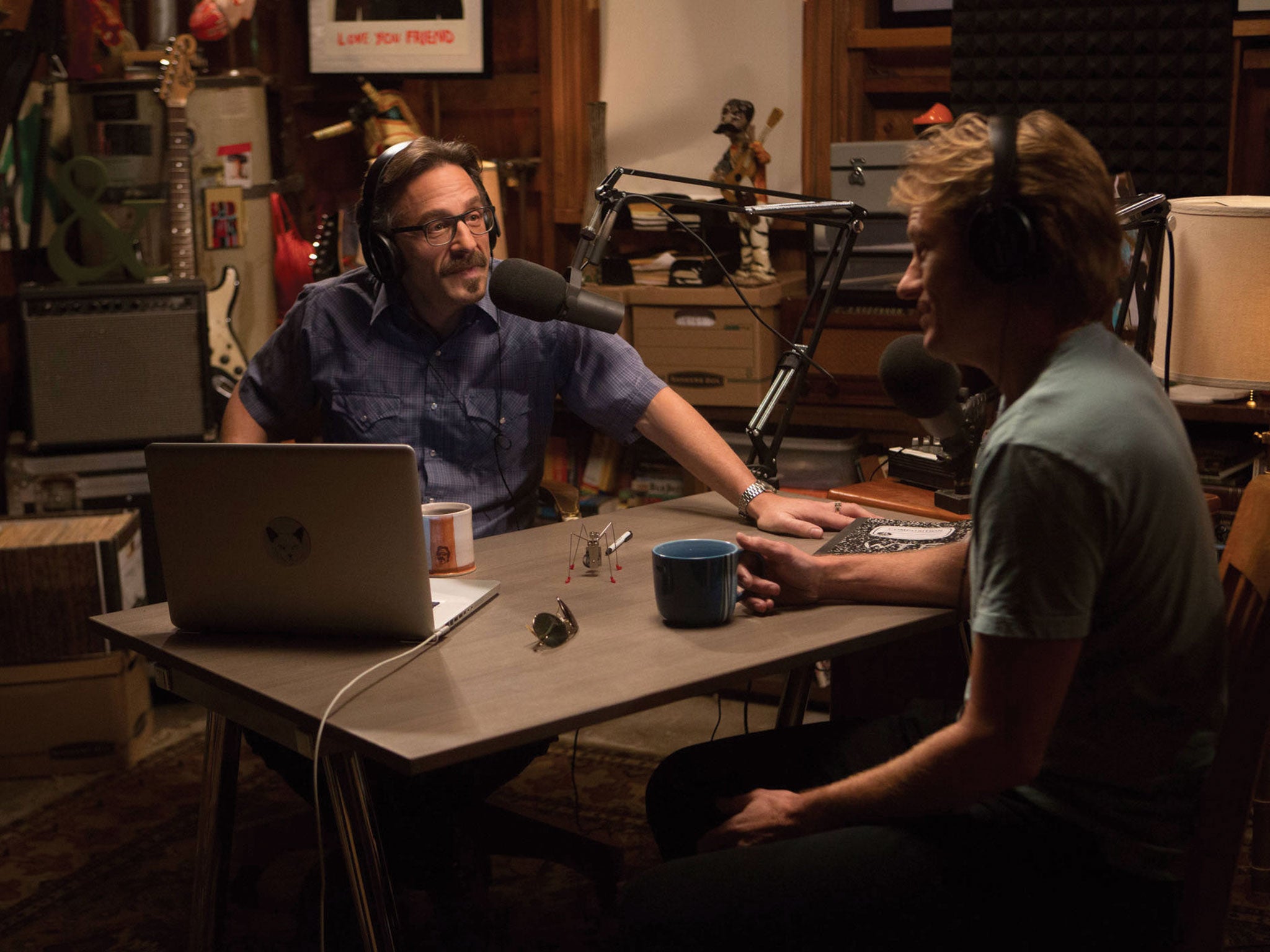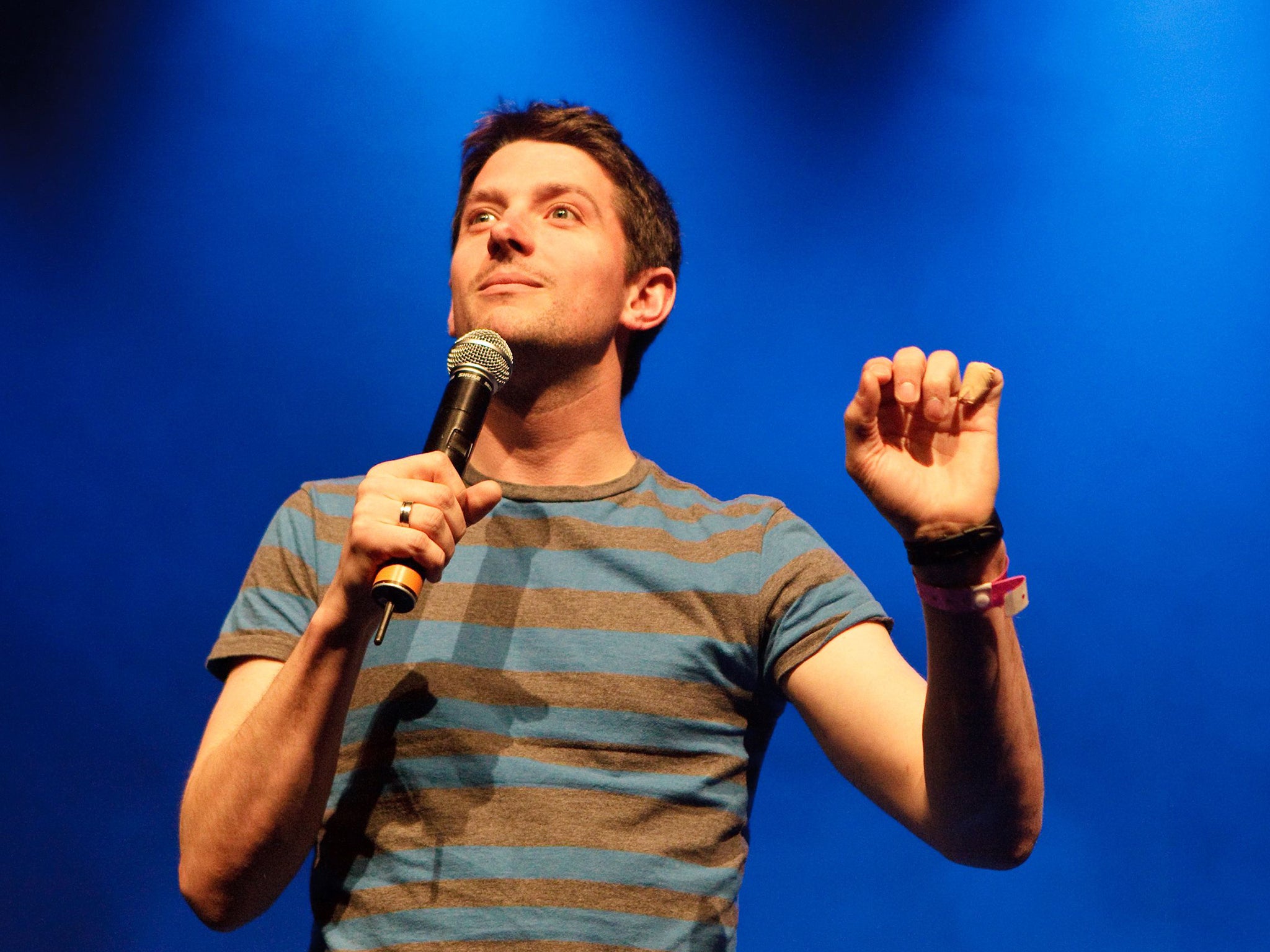How comedians talking comedy became a serious business
Hollywood producer Judd Apatow’s new book Sick In The Head is only the latest offering from a burgeoning cottage industry dedicated to deconstructing the art of the stand-up

Great comedians have long attracted devoted fans. They bring us joy and we love them for it.
Unlike pop stars or actors, the appeal of those men and women bold enough to step out into the spotlight and reach for the mic is tied to relatability. However surreal the act or eccentric their appearance, stand-ups trade in universals, observations about the absurdities of everyday life that chime with the experiences, frustrations and anxieties of their audience.
They could be you or I. You know, if we were hilarious and daring.
Comedy buffs may see their favourite act on the circuit, at festivals, on TV specials or panel shows many times a year and become as familiar with their material as they are with the underworld of pub backrooms and dank theatre basements such creatures inhabit.
It’s only natural then that acolytes attuned to the form’s rhythms and structures should increasingly be turning their attention to comedians talking about comedy in addition to catching them on tour.
A whole industry has arisen catering to this hunger for insights into the comic mind, with Hollywood super-producer Judd Apatow’s recent book Sick in the Head only the latest to address the desire to hear comedians discuss their craft and its workings in intricate detail.
Apatow’s interview collection capitalises on the nerdy networking he engaged in as a high school student, when he exploited a slot on a local radio station as a pretext to record interviews with his stand-up heroes, ostensibly for broadcast but really just for personal satisfaction. The book carries transcripts of those juvenile conversations with the likes of Steve Allen and Garry Shandling as well as more recent chats with 21st century stars such as Chris Rock, Key and Peele and Lena Dunham.
Apatow’s work makes for a fascinating read and belongs on the shelf alongside Steve Martin’s memoir Born Standing Up (2007) or How I Escaped My Certain Fate (2010), in which Stewart Lee painstakingly deconstructs his own already archly meta routines with exhaustive annotations and footnotes that might have given David Foster Wallace sleepless nights.
But it’s the podcast that’s the real home of comedians talking comedy.
Perhaps the daddy of these is WTF with Marc Maron, a chatty, long-running series recorded in its host’s Los Angeles garage (or “Cat Ranch”) that defies its lo-fi, amateurish aesthetic with an incredibly high calibre roster of guests.
The pod made international news in June 2015 when the CIA descended on Maron’s suburban residence to secure the premises for President Obama’s appearance. An astute and sensitive interviewer, Maron himself is a successful stand-up and, like Apatow, uses his industry connections and location to secure conversations with Tinseltown megastars.
Memorable recent encounters include a Keith Richards episode in which Maron smokes his first cigarette in 10 years in tribute to the well-worn idol and one with Saturday Night Live maestro Lorne Michaels, in which Maron, an agreeably neurotic and thin-skinned individual at the best of times, confronts the showbiz kingpin with a grudge stemming from his own failed audition for SNL in 1996.

The British answer to Maron is Stuart Goldsmith, another working comic and the jovial host of The Comedian’s Comedian podcast. An equally perceptive and thoughtful wielder of questions, Goldsmith grills his prey in front of a live audience, typically at venues such as London’s Soho Theatre or during the annual Edinburgh Festival. Some of Goldsmith’s best work includes his growing exasperation at one-liner supremo Stewart Francis when the latter appears entirely unable to resist the temptation to do gags and an astonishing encounter with shouty Canadian oddball Tony Law, apparently in a state of “heightened refreshment”.
As well as grappling with the career trajectories and evolving approaches of his subjects, Goldsmith’s show is also strong on the mental strain of working the circuit, addressing the depression and doubt many entertainers experience on the way up with commendable sympathy. Richard Herring's rival Leicester Square Theatre Podcast covers much of the same territory, albeit with a less methodical, more freewheelin' approach to dissecting its guest's act.
Another British addition to the genre are the In Conversation live events hosted by Standard Issue magazine. Founded by stadium comic Sarah Millican, the website regularly holds panel discussions with the country’s leading female comedians. Chaired by editor Mickey Noonan, luminaries gathering to discuss current affairs and the business of being funny have included everyone from Katherine Ryan, Sara Pascoe, Dawn French, Jo Brand and Bridget Christie to Jo Caufield, Susan Calman, Isy Suttie, Sharon Horgan, Shappi Khorsandi... the list is endless.

Back online, Jerry Seinfeld’s Comedians in Cars Getting Coffee is a web series in which the sitcom legend picks up his interviewees from their homes in a vintage automobile and takes them out for a spin to chew the fat. Like Apatow and Maron, Seinfeld exploits his unrivalled contacts book to arrange memorable encounters with America’s brightest comedy stars. Going boating with Jimmy Fallon, suffering an overheated engine with Amy Schumer, buying trainers with Kevin Hart – it’s all in a day’s work.
Yes, the fetishisation of old sports cars might not be to everybody’s taste, but it’s an entirely forgivable self-indulgence from a host who often reveals more about himself than his passengers, notably when expressing impatience as Stephen Colbert extols the virtues of Neutral Milk Hotel lyrics or frank annoyance at slow-moving hipster baristas in Oregon in the company of Portlandia’s Fred Armisen.
Talking-head documentaries further feed into this multimedia onslaught. Quality varies, with some Netflix filler inevitable, but films like When Jews Were Funny (2013), Misery Loves Comedy (2015) and the forthcoming Dying Laughing (2016) all feature the familiar line-up of box office names discussing their peculiar path to fame and fortune. One, The Aristocrats (2005), even focuses solely on the mechanics of a single (utterly filthy) joke: “A man walks into a talent agent's office...” This latter format perhaps comes closest to betraying the phenomenon’s roots. It’s essentially the product of 20 years of the DVD special feature.

So why are we so interested? Doesn’t all of this intensive analysis suffocate the spontaneity of the bit? Well no, really. As a thousand TED Talks have proved, it’s always fascinating to hear specialists talking about their fields of expertise and, in this instance, the experience is frequently very funny, revealing and even moving, adding a further tier of nuance and understanding for those cultish enough to pursue their heroes beyond a boozy one-hour set in Jongleurs or the Comedy Store.
The obsessive hunt for a funny idea or the right punchline, the constant toying with why this word is funnier than that one or why this inflection gets a laugh but that emphasis doesn’t is a way of life for certain kinds of minds. And it’s a preoccupation with few definite conclusions. As WC Fields reflected in his 1934 essay “Anything for A Laugh” about his youth in American vaudeville: “I know what makes them laugh, but trying to get your hands on the why of it is like trying to pick an eel out of a tub of water.”
Dissecting a comic’s methods ultimately tells us so much about how some (highly unusual and preternaturally articulate) people perceive and interpret the world around them. A new platform for humour at one remove, the talking shop industry also provides a rare opportunity to see behind the curtain and achieve a deeper understanding of those complex personalities who find themselves drawn to the light and compelled to entertain.
Join our commenting forum
Join thought-provoking conversations, follow other Independent readers and see their replies
Comments
Bookmark popover
Removed from bookmarks